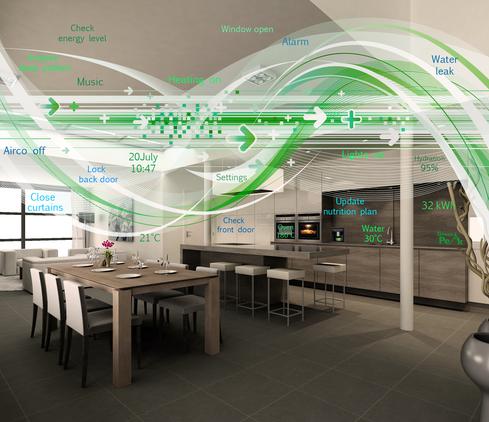A WiFi pioneer says we need to rethink how the Internet of Things is being marketed and sold. For starters, how about finding a better name?


10 Ways Windows 10 Will Advance The Internet Of Things
10 Ways Windows 10 Will Advance The Internet Of Things (Click image for larger view and slideshow.)
WiFi pioneer Cees Links knows a little about connectivity. After selling Steve Jobs on the concept of WFi and helping to make the technology small enough to fit into smartphones and other mobile devices, Links is now CEO of GreenPeak, a company making chips for the Internet of Things (IoT).
Links is also an advocate of Zigbee, a low-power radio technology that he believes is perfect for IoT. So what does Links think is holding back IoT?
For starters, Links doesn't like the term itself. "Internet of Things is the wrong name because it isn't about things," said Links in an interview with InformationWeek. "It is about services." While we're at it, he doesn't like "smart" either. "Smart home is a wrong name and a wrong concept," he said. "Consumers can't buy a smart home at a store. They buy applications."
According to Links, in order to make "smart" anything appeal to people, or to help "IoT" make sense, we need to change our thinking. "Most people are inclined to think of the smart home as a bunch of devices," he said. "[At GreenPeak] we think of it as a service. We think you should talk about a butler, someone who delivers a service in your home. Imagine there's nobody in the home, and the backdoor is unlocked or a window is open and it is raining. You'd expect the butler to lock the door or close the window."
Further, Links said IoT has a marketing problem. IoT is marketed to "gadget people," he said, when instead it should be all about what services you can now afford. You can't afford a butler, but you can afford a device that locks your back door for you when you forget. When many companies use the term "smart" it isn't smart for the user, but for the person who sells it.
"We had a smart water meter in our house, and our basement flooded," said Links. "Did the meter tell us about unusual water flow? Did it turn the valve off? No. It just told the water company how much to charge."
It is that inability to serve the customer that Links thinks is holding back IoT, rather than the security concerns or privacy issues that are often topics of discussion. When asked about security, Links said, "Security and privacy are not issues in isolation. They are not issues for the IoT. These are issues of the Internet in general. Security and privacy of your home and what you put on Facebook are essentially not different."
[ What else is limiting IoT? Read Internet of Things: What's Holding Us Back. ]
When questioned about new attack vectors, Links gave a surprisingly simple and straightforward answer. "Attack vectors apply to the physical world as well." These include the keys in your house, and whether you remembered to lock the back door. In other words, IoT can add to security as much as it can take it away.
Complexity, Cost Are Obstacles
So if security isn't the holdup, why can't companies figure out how to make products that serve customer needs for IoT? Links said it is about the complexity of the environment. "IoT is way more complex than, say, WiFi," Links said. "We invented WiFi, and because of Apple and Intel we got it in the PC world. But the PC world is way less complex [than IoT]. There are only a few operating systems. The input and the output is the same on all systems."
Links noted that creating products and applications for IoT is more complicated than building for the traditinoal PC environment. "The problem with the smart home is its lack of uniformity," he said. "I've heard of no one who has refused a hotel room because it has an electronic key. But no one has [electronic keys] for their house because every country has a different door lock system. There is no Microsoft for door locks. Electronic keys aren't rolled out on a worldwide basis like PCs are. Complexity and cost [are] slowing down the propagation, and when you add the poor marketing of products as things and not services, things go slower."
Links does see hope, however. Chips are getting cheaper, and sensors will hopefully follow suit, he said. But companies in the IoT space need to understand what they have and what they are selling. He used the fitness tracker as an example. The fitness tracker is sold as a gadget, rather than as a "life coach." Because of that, people often give up on it. And Links said he think this is because of the way fitness trackers are marketed and sold. "The most recent fitness band from Jawbone is $180," he said. "Instead of selling it as an expensive device with a sensor, they need to sell it as a service for a few dollars per month." Links said that change will help consumers understand what they are buying.
So how close are we to a real smart home filled with connected devices? Links said he sees a smart home in five to 10 years that is fully connected to the Internet and analytics to tell us when things are happening out of the ordinary. But it will take some rethinking. "We see the technology coming in bits and pieces, and we're waiting for the product builders with the guts to pull it all together."
About the Author(s)
You May Also Like







